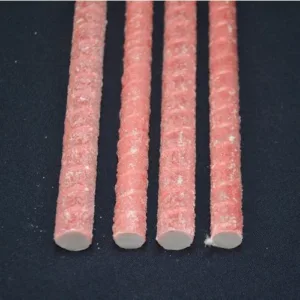Introduction
In the world of construction and infrastructure development, the choice of reinforcement material plays a crucial role in determining the longevity and durability of structures. Traditionally, steel rebar has been the go-to choice for reinforcement, but in recent years, pink bar fiberglass rebar has emerged as a potential alternative. This article aims to compare and contrast the two materials, exploring their properties, advantages, and drawbacks, to help builders and engineers make informed decisions.

pink bar fiberglass rebar
1. Understanding the Basics of Rebar
What is Rebar?
Rebar, short for reinforcement bar, is a crucial component in reinforced concrete structures. It adds tensile strength to the concrete and prevents it from cracking under heavy loads.
Types of Rebar
There are primarily two types of rebar commonly used in construction – steel rebar and pink bar fiberglass rebar.
2. Properties of Steel Rebar
Strength and Durability
Steel rebar is renowned for its exceptional strength and durability, making it suitable for a wide range of construction projects, including high-rise buildings and bridges.
Corrosion Resistance
One of the key drawbacks of steel rebar is its susceptibility to corrosion, especially in harsh environmental conditions.
Thermal Conductivity
Steel rebar has high thermal conductivity, which can lead to potential issues in structures subjected to extreme temperatures.
Cost and Availability
Steel rebar is widely available and relatively cost-effective, making it a popular choice among builders.
3. Properties of Pink Bar Fiberglass Rebar
Lightweight and High Strength
Pink bar fiberglass rebar boasts excellent tensile strength while being significantly lighter than steel rebar, making it easier to handle during construction.
Corrosion Resistance
Unlike steel rebar, pink bar fiberglass rebar is immune to corrosion, ensuring enhanced longevity and reduced maintenance costs for structures.
Non-Conductive and Non-Magnetic
Another advantage of pink bar fiberglass rebar is its non-conductive and non-magnetic nature, making it suitable for applications where electromagnetic interference is a concern.
Cost and Availability
While pink bar fiberglass rebar may have a higher initial cost, its long-term benefits and reduced maintenance expenses offset this aspect.
4. Comparison between Steel Rebar and Pink Bar Fiberglass Rebar
Strength and Load-Bearing Capacity
Steel rebar is known for its exceptional strength, making it ideal for heavy-load structures. However, pink bar fiberglass rebar’s strength is not far behind and can cater to many construction needs.
Weight and Handling
Pink bar fiberglass rebar’s lightweight nature makes it easier to transport and handle, reducing labor-intensive processes during construction.
Corrosion Resistance
While steel rebar requires additional protection against corrosion, pink bar fiberglass rebar’s inherent resistance saves additional costs and efforts.
Thermal Conductivity
Pink bar fiberglass rebar’s lower thermal conductivity is beneficial in applications where temperature fluctuations are common.
Cost Considerations
The initial cost of pink bar fiberglass rebar may be higher, but its durability and longevity can lead to cost savings in the long run.
5. The Best Choice for Your Project
Considerations for Choosing Rebar
The choice between steel rebar and pink bar fiberglass rebar depends on the specific project requirements, budget, and environmental factors.
Recommended Applications
Steel rebar remains a reliable choice for traditional constructions, while pink bar fiberglass rebar is suitable for projects seeking durability, corrosion resistance, and weight reduction.
6. Conclusion
In conclusion, both steel rebar and pink bar fiberglass rebar offer unique benefits to construction projects. Steel rebar is time-tested, strong, and widely available, but it is prone to corrosion. On the other hand, pink bar fiberglass rebar provides corrosion resistance, lighter weight, and non-conductive properties. The best choice depends on the project’s needs and the builder’s priorities.
FAQs
- What is the main purpose of rebar in construction?
- Rebar provides tensile strength to reinforced concrete structures, preventing cracking and enhancing durability.
- Does pink bar fiberglass rebar have a lower load-bearing capacity compared to steel rebar?
- While steel rebar boasts higher strength, pink bar fiberglass rebar offers sufficient load-bearing capacity for many construction applications.
- Can pink bar fiberglass rebar be used in high-rise buildings?
- Yes, pink bar fiberglass rebar is suitable for use in high-rise buildings due to its excellent strength and durability.
- How does pink bar fiberglass rebar withstand extreme temperatures?
- Pink bar fiberglass rebar’s lower thermal conductivity helps it withstand temperature fluctuations without compromising structural integrity.
- Is pink bar fiberglass rebar cost-effective in the long run?
- Despite its higher initial cost, pink bar fiberglass rebar’s durability and reduced maintenance costs make it cost-effective in the long term.




























